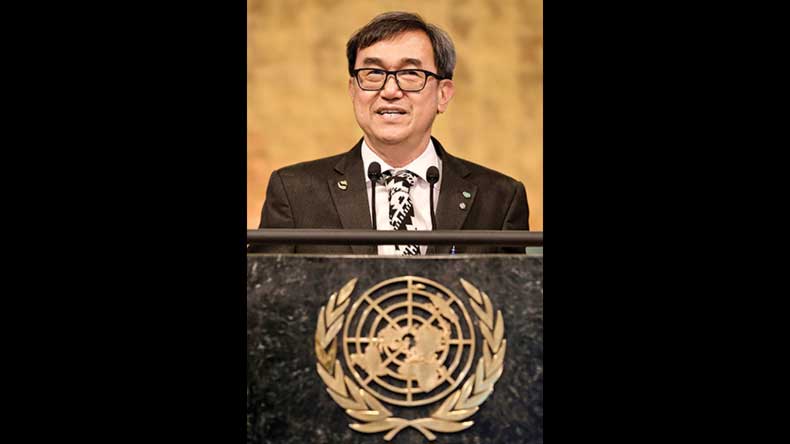As 193 countries across the globe observed World Toilet Day on Saturday, 19 November, the man behind the idea was in India to participate in an international conference on sanitation. Jack Sim, known worldwide as Mr Toilet, has been instrumental in policy change on sanitation in 15 countries. And in India, he had a few words of wisdom for the government’s Swachh Bharat Abhiyaan. “You firstly have to understand the rural-urban divide in the country about the usage of toilets. In urban areas, there is awareness for the need of toilets. For rural areas, it is against their habit of thousands of years. You have to create jealousy, make your toilets so clean, beautiful and colourful, that others would envy them. They would want such toilets. Look at the poor as customers who will get attracted to good-looking products. People complain that cell phones are expensive. But do they stop buying them? Toilets too should be made desirable,” he said during his exclusive interview to The Sunday Guardian.
When quizzed about how it could be done, he said, “See, the poor need colours in their lives. The perception about toilets in India is that they are dirty, smelly and grey. That perception has to change. Toilets should be colourful, bright, clean and happy places. They should be as bright as the colour of the saris of rural women. That is what the poor are looking at—creating colour in their lives. Toilet is the happiest room.” He said he has tried the idea in Andhra Pradesh, and it is working there.
Jack Sim is in Mumbai to attend the Sanitation Action Summit organised by the international organisation, Water Supply and Sanitation Collaborative Council (WSSCC), in collaboration with Government of India. He has recently inaugurated the Swaccha Bharat fellowships in India.
Jack Sim, aka Mr Toilet, is known for his work in advocacy of toilets globally. He is the founder of the World Toilet Organisation, and has been instrumental in policy change on sanitation in 15 countries including Singapore, China, the United States, Australia and Japan. He has also partnered with the United Nations for sanitation advocacy.
His successful international campaigns include Singapore’s “Potty Parity” policy passed in 2005, partnering with China during Beijing Olympics to build 4,000 toilet blocks, leading to “Tourism Toilet Revolution” in China recently. The World Toilet Organisation also partnered successfully with the United Nations to start the UN World Toilet Day a few years ago. Now, it is celebrated on 19 November every year.
Sim is currently working with the Andhra Pradesh government as a co-convenor of Swacch Andhra mission to make the state open defecation-free. Two districts of the state have already achieved the target. He has travelled extensively throughout the state in the last two years, bringing his global expertise to the country.
In India, 13 children under five years of age die every hour due to diarrhoea. According to Government of India, lack of sanitation is killing over 1.2 lakh children under five years of age every year. “Nearly 90% of India’s water sources are contaminated with faeces. Sanitation and hygiene are a serious issue. And we need to find workable solutions for them,” Sim said.
SWACHH BHARAT
Talking about the impressions he gathered about India’s Swachh Bharat Abhiyaan, he said that currently the government’s focus was supply-driven, and not demand-driven. “People have to demand toilets. There has to be effective behavioural change. Otherwise, the toilet blocks which have been built, will continue to function as warehouses. People in the rural areas are used to defecating in the open. You have to make people want to have toilets. That is the biggest challenge,” he said.
To make that happen, he suggested that toilets should be made as desirable as cell phones or motorcycles. “People don’t stop buying these things even if they are expensive. Toilet should become an aspiration.” And how do you make people aspire for toilets?
“Use jealousy. That is a very strong tool. Make beautiful toilets. Let people show them off. Those who do not have them, will want to have them. In rural areas, people do not like being looked down on. If you create beautiful, colourful toilets, people’s attitudes will change. And you have to make people pay for their toilets. Don’t pay the entire sum,” he added.
CHINA’S TOILET REVOLUTION
While talking about the changes in attitude towards sanitation worldwide, he gave an example of China’s move towards building more toilets. “The President of China recently gave a call for transformation of toilets. He said that if tourism has to transform, toilets have to be transformed first. China has embarked on a project of building 25,000 tourist toilets by 2017. In Singapore, Sim’s advocacy led to change in the policy on toilets. “The Singapore government passed potty parity policy in the year 2005. Under this, the women’s toilet blocks have been made bigger in size.
Women have also been allotted more toilets than men, because they need them. So, there are no more queues outside toilets in Singapore,” he said.

